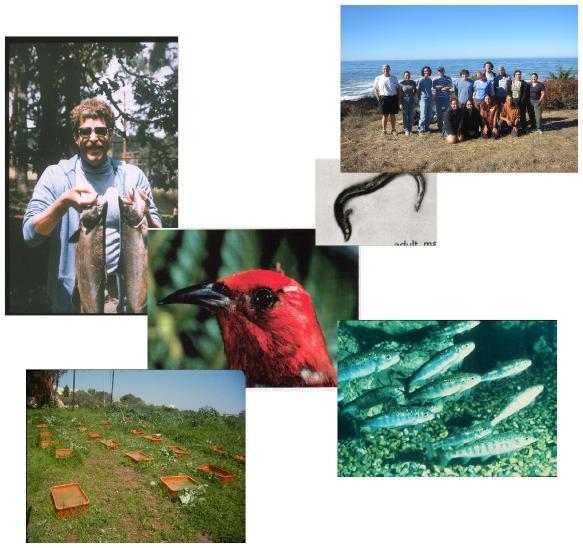Interests
� I am Distinguished Professor of Mathematical Biology Emeritus in the Department of Applied Mathematics at the University of California Santa Cruz and Professor of Biology Emeritus in the Theoretical Ecology Group (Visit the TEG) at the University of Bergen, Norway. In my first job out of graduate school, I worked for the Operations Evaluation Group (OEG, OEG) of the Center for Naval Analyses doing operations research for the Navy. I moved to UC Davis in 1980 with the intention of doing OEG-style work, but with applications to fisheries and agriculture, and to UC Santa Cruz in 1996. I retired from formal teaching and administrative work in 2013 but continued an active research program with extramural grant support through 2022 and continue to do research. I am broadly interested in using mathematical methods to solve problems that arise in biology (especially ecology, evolution, and behavior) and work in what Donald Stokes called, in a wonderful book of the same name, Pasteur's Quadrant of use-inspired research, where a search for fundamental understanding is motivated by an important applied problem
Current Research Projects
In addition to a long-standing collaborative project on reproductive biology of rockfish species, I have three current research projects.Modeling he Organism in Its World : It is my opinion that state dependent life history theory as implemented by stochastic dynamic programming (and illustrated in my books and papers) will remain a very powerful tool for understanding the behavior of organisms in their worlds. At the same time, it is not likely that organisms do stochastic dynamic programming in their brains, and for many years I have collaborated with colleagues at the University of Bergen to seek alternative methods with higher fidelity to nature for modeling how organims make decisions. Some of the papers on this topic are
2003 Giske, J., Mangel, M., Jakobsen, P., Huse, G., Wilcox, C. and E. Strand. Explicit trade-off rules in proximate adaptive agents. Evolutionary Ecology Reseach 5:835-865.
2013 Giske, J., Eliassen, S., Fiksen, O., Jakobsen, P.J., Aksnes, D.L., Jorgensen, C., and M. Mangel. Effects of the emotion system on adaptive behavior. The American Naturalist 182:689-703
2014 Giske,J., Eliassen, S., Fiksen,O., Jakobsen, P.J., Aksnes,D.L., Mangel, M. and C. Jorgensen The emotion system promotes diversity and evolvability. Proceedings of the Royal Society B 281 20141096
and (which is the best introduction to our work)
2019 Budaev, S., Jorgensen, C., Mangel, M., Eliassen, S., and J. Giske. Decision-making from the animal perspective: Bridging ecology and subjective cognition. Frontiers in Ecology and Evolution. May 2019, Volume 7, Article 164. There are many other papers on this topic on which I am not a co-author; they can be found at the (web site of the Theoretical Ecology Group in Bergen ).
I am working on a new version of the models with the goal of simplifying the computational methods in order to make them more generally accessible and applying the approach to a wider variety of organisms (including plants) to help people see the broad sweep of these ideas. My first motivation is habitat selection, with desert isopods as a motivating species; my second motivation is octopuses. I am deep into the modeling work on isopod habitat selection and learning about octopuses. In addition, with colleagues in Bergen, I am part of a team developing a digital twin for salmon. This work started in summer 2023, so stay tuned for results.
Seabirds as Samplers: The Inverse Behavioral/Life History Problem for Fishery Management Assessing the current status of a fish stock will always be important for determining catch levels in fisheries. It is my opinion that advanced statistical methods will continue to play important roles for this question. However, there are also opportunities to explore novel approaches. One of these is the inverse behaviorial and life history problem. The basic idea is that with a life history model, we specify the environment and use methods such as state dependent life history to predict behavior and life history transitions. The inverse problem consists of starting with the behavior or life history transitions and inferring the environment from these, by comparing model predictions from different environments with the observations. An example of this is, concerning the rate of natural mortality, is this:2017 Mangel, M. The inverse life-history problem, size-dependent mortality and two extensions of results of Holt and Beverton. Fish and Fisheries. DOI: 10.1111/faf.12247
I am now developing methods to infer the abundance of food in a three patch model. This work also started in summer 2023, so results to come.
Population Biology and Cybersecurity : Between 2018 and 2023 , I collaborated with colleagues at the Johns Hopkins University Applied Physics Laboratory on using models from population biology to inform various aspects of cyber-security. In June 2020, like many of my colleagues, I worked with colleagues at APL think about testing for covid-19, both at APL and in Howard County, MD (where APL is located) more generally. They cyber work with APL colleagues has appeared here:2021 Mangel, M. and J. McEver. Modeling coupled nonlinear multilayered dynamics: Cyber attack and disruption of an electric grid. Complexity Research Article Modeling Coupled Nonlinear Multilayered Dynamics: Cyber Attack and Disruption of an Electric Grid doi.org/10.1155/2021/5584123
2022 Mangel, M. and A. Brown. Population processes in cyber system variability. PLoS ONE 17(12): e0279100. doi 10.1371/journal/pone.0279100
I am also writing a book for World Scientific Publications on population biology and cyber security.The covid-19 work appeared as two APL reports and a journal article:
2021 Brown, A. and M. Mangel. Operational Analysis for Coronavirus Testing. Recommendations for Practice. Report, National Security Analysis Division, Johns Hopkins University Applied Physics Laboratory
2021 Mangel, M. and A. Brown. Operational Analysis for Coronavirus Testsing. Report, National Security Analysis Division, Johns Hopkins University Applied Physics Laboratory
2023 Mangel, M. COVID-19. PLos ONE 18(2) e0281710 doi 10.1371/journal/pone.0281710

